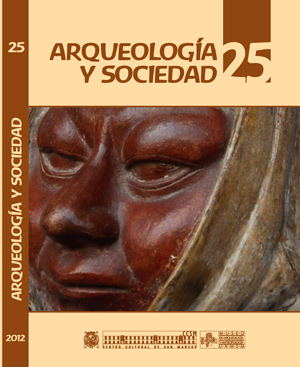EDUCATIONAL ROLE OF ARCHAEOLOGY AND ARCHAEOLOGICAL HERITAGE TEACHING. EXPERIENCES AND PROPOSALS
DOI:
https://doi.org/10.15381/arqueolsoc.2012n25.e12382Keywords:
Education, didactic archaeology, Patrimony, archaeology workshops.Abstract
The relationship between archaeology and education as disciplines is recent: archaeology is a high potential pedagogic tool because it is capable of generating transversal knowledge and transvers ability is one of the bases of apprenticeship. The archaeology has an important pedagogic role. Our patrimony will benefit if archaeology and education get close to each other by means of the participation of archaeologists, teachers and students. The Social Science teacher needs to use evidence of the past, which is the «raison d’etre» of history in the process of learning of the students. School is a privileged space for the construction of the apprenticeship of the students, but this will be fulfilled with more effectiveness if there were a relationship between school and the historical reality of its surroundings. That is why it is important for the students to know their personal, local, and regional history using the means they have on hand such as visits to archaeological sites and museums. There are many archaeological sites in our country and it would be absurd no to use them in the teaching-learning, because, just the direct contemplation of those monuments encourage the interest of students, favouring its study by students. If we relate archaeology to the teaching-learning process of the prehispanic history of our country, we can say that the direct archaeological sources such as archaeological sites tangibilizes the teachinglearning sources. So the process of learning of the student will be more effective. Archaeoly motivates the students to discover the unknown. It potencializes team work, teaches conservation values and respect for historical and cultural patrimony. Working with the knowledges produced by archaeology through this type of didactical proposals (workshops), enhances the students to be conscious of social values, besides making the history as their own, serving as a means for the students to reflect as a part of it. The recreational archaeology has become a new ludical source for the study of history because it pretends to put the history close to the students so that they could get to know it as if it were a game.Downloads
Published
Issue
Section
License
Copyright (c) 2012 Consuelo González Madueño

This work is licensed under a Creative Commons Attribution-NonCommercial-ShareAlike 4.0 International License.
THE AUTHORS RETAIN THEIR RIGHTS:
a. The authors retain their trademark and patent rights, and also on any process or procedure described in the article.
b. The authors retain the right to share, copy, distribute, perform and publicly communicate the article published in the Arqueología y Sociedad (for example, place it in an institutional repository or publish it in a book), with an acknowledgment of its initial publication in the Arqueología y Sociedad.
c. The authors retain the right to make a subsequent publication of their work, to use the article or any part of it (for example: a compilation of their works, notes for conferences, thesis, or for a book), provided that they indicate the source. of publication (authors of the work, journal, volume, number and date).






